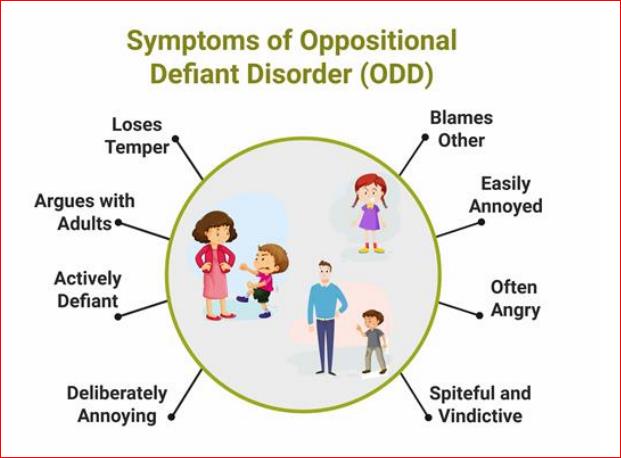Oppositional Defiant Disorder (ODD): Signs And Symptoms
30th March 2024

Stubborn, inflexible, defiant, argumentative, and stubborn all these terms are frequently used to characterize a pupil who has behavioral problems. Is the conduct your students are exhibiting consistent with Oppositional Defiant Disorder (ODD) or is there another possible cause? ODD is a condition that can have an impact on a student's life at home and school. While a professional diagnosis is necessary for ODD, educators can spot behavioral characteristics in their students by keeping an eye out for the symptoms.
What Is Oppositional Defiant Disorder (ODD)?
Before we move on to the signs and symptoms let us first understand what is Oppositional Defiant Disorder (ODD).
Research reveals that around 2%-16% of the children have ODD. This disorder is more common in boys when they are young. However, for teens, it happens equally in both girls and boys.
A kid with oppositional defiant disorder (ODD) exhibits a pattern of aggressive or combative conduct, resentment toward those in positions of authority, and an angry or irritable mood. The child's actions frequently cause disruptions to their everyday schedule, affecting both home and school activities.
Children frequently challenge authority, especially those in their ‘terrible twos’ and early adolescence. They might argue, disobey, or respond angrily to their parents, teachers, or other adults as a way of showing their disobedience. If the kid's conduct persists for more than six months and is more severe than typical for their age, it may indicate that the youngster has ODD.
In addition to attention deficit disorder, learning difficulties, mood disorders (including depression), anxiety disorders, and other behavioral issues, many kids and teenagers with ODD also struggle with other behavioral issues.
Conduct disorder is a more severe type of behavior disorder that some children with oppositional defiant disorder develop later in life. A youngster diagnosed with conduct disorder exhibits antisocial behavior, including theft, bullying, and brutality to both humans and animals.
Do you follow us on Social Media? We regularly share upgraded educational content, tips, feedback, and more. Check us out by clicking the profiles here - Facebook / Twitter / LinkedIn / Pinterest / Instagram / YouTube
Signs And Symptoms Of ODD

Here are some of the most common signs and symptoms of ODD in children:
- Has an angry or annoyed attitude
- Argues with peers and adults
- Refuses to respond to requests and instructions
- Questions rules and expectations disrespectfully
- Frequently pulls tantrums and acts out
- Look for ways to actively annoy others
- Denies accepting the consequences of one's behavior
- Blames others for their actions
- Uses angry and inappropriate language with family members and peers
- Seeks revenge for unintended or real ‘slights’
- Always acts vindictively toward others
Symptoms of ODD in adults:
- Possess a lot of anger towards the world
- Generally feels unappreciated, misunderstood, or disliked
- Have strong attitudes of disrespect and disdain towards authority
- Are pretty impatient
- Possess a habit of defending themselves forcefully
- Refuses to accept feedback from others
- Have very low frustration tolerance
- Have trouble maintaining romantic relationships, jobs, and friendships due to conflict
- It is difficult to follow expectations and rules at work
Most extreme symptoms:
- Demonstrates signs of severe anxiety and depression
- Appears to have not slept or shown signs of losing weight
- Shows warning signs of self-harm
- Sees or hears things that others might not notice
Symptom overlap:
- Attention Deficit Hyperactivity Disorder (ADHD)
- Conduct disorder
- Bipolar disorder
- Depression
- Antisocial Personality Disorder
- Disruptive Mood Dysregulation Disorder
Because of this overlap, diagnosing ODD in teenagers and young adults may be more challenging for professionals. It's also important to remember that some of these actions are rather typical of teenagers. Because of this, it may not always be simple for parents and educators to distinguish between more usual teenage attitudes and milder ODD symptoms.
ODD Prevention
There is evidence that early intervention, such as home visits to high-risk families or Head Start programs, can help prevent ODD in preschool-aged children. Though findings are inconsistent, social skills training, conflict resolution training, and anger management training may be beneficial for older children.
Treatment works best when it is initiated early. It's critical to get immediate treatment from a licensed mental health professional if your child exhibits symptoms of ODD. Children with ODD may experience rejection from friends and classmates if they don't receive therapy because of their poor social skills and behavioral issues.
Understand ODD For Treating Your Child Better
While preventing this disorder may not always be feasible, many of the issues associated with the illness can be avoided by identifying and treating symptoms as soon as they arise. Creating a loving, caring, and discipline-filled family atmosphere can assist manage symptoms and stop rebellious behavior outbursts. Family members along with teachers can pursue ADHD Courses Online and can discover what to do if they witness a recurrence of symptoms.
We believe education should be accessible for everyone. That’s why we don’t charge for our blogs. Find the right course that will help you in your career with us, contact us at +6621056101. You can mail us at act@asiancollegeofteachers.com

